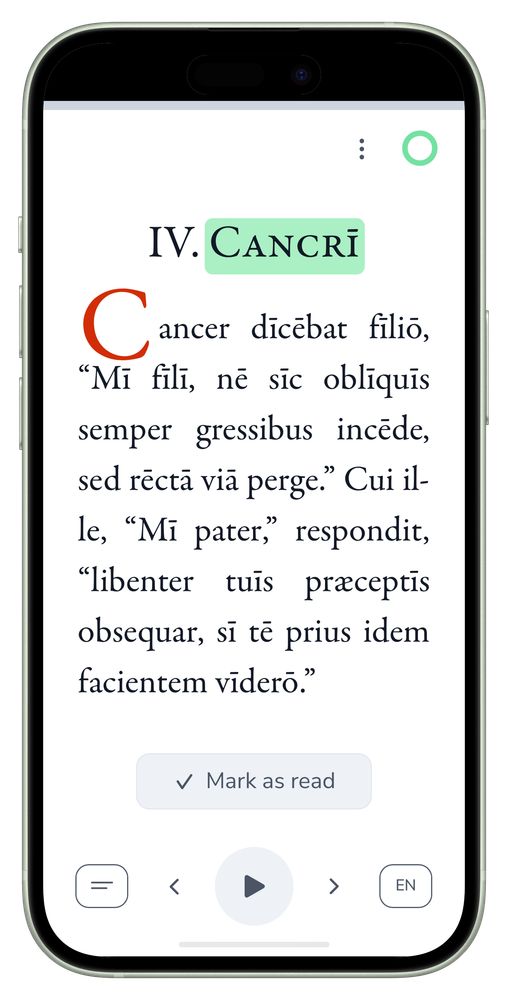
Ain’ is a contracted form of ais-ne, literally meaning "do you say?" The -ne indicates that it is a question.
Ain’ is often used in Roman comedy when a character is incredulous, surprised, or upset about a statement by another character, i.e. "Is that so?"

Ain’ is a contracted form of ais-ne, literally meaning "do you say?" The -ne indicates that it is a question.
Ain’ is often used in Roman comedy when a character is incredulous, surprised, or upset about a statement by another character, i.e. "Is that so?"
"Pānis" can mean both an unspecified amount of bread, and "a loaf of bread." Note the ending -em; this ending, called the accusative, is used when it is the object of an action. Here the bread (pānis) is the object of the action of giving.

"Pānis" can mean both an unspecified amount of bread, and "a loaf of bread." Note the ending -em; this ending, called the accusative, is used when it is the object of an action. Here the bread (pānis) is the object of the action of giving.
When indicating who is saying something in a dialogue, Latin commonly inserts a form of 𝐢𝐧𝐪𝐮𝐢𝐭 ("says he/she") into the sentence of the speaker, usually after the first word or thought, e.g. "Salvē!" inquit Mārcus ("'Hello!' says Marcus").

When indicating who is saying something in a dialogue, Latin commonly inserts a form of 𝐢𝐧𝐪𝐮𝐢𝐭 ("says he/she") into the sentence of the speaker, usually after the first word or thought, e.g. "Salvē!" inquit Mārcus ("'Hello!' says Marcus").
𝐸𝑐𝑐𝑒 is used to call attention to a person or object ("look at this; here is," etc.). Compare it to the French voilà.

𝐸𝑐𝑐𝑒 is used to call attention to a person or object ("look at this; here is," etc.). Compare it to the French voilà.
Pythia was the priestess of Apollo who pronounced the responses of the oracle. According to one tradition, she operated inside the temple by a sacred chasm beneath the site emitting vapors, which Pythia inhaled and gave cryptic responses.

Pythia was the priestess of Apollo who pronounced the responses of the oracle. According to one tradition, she operated inside the temple by a sacred chasm beneath the site emitting vapors, which Pythia inhaled and gave cryptic responses.
Although "magnus, -a, -um" literally means "large, big," with the word for money ("pecūnia") it means "much," "a large sum of money."

Although "magnus, -a, -um" literally means "large, big," with the word for money ("pecūnia") it means "much," "a large sum of money."
Forms of the word 𝑒𝑠𝑠𝑒 ("to be"), such as 𝑒𝑠𝑡 or 𝑠𝑢𝑛𝑡 placed towards the beginning of a phrase often have the meaning of "there is" or "there are."

Forms of the word 𝑒𝑠𝑠𝑒 ("to be"), such as 𝑒𝑠𝑡 or 𝑠𝑢𝑛𝑡 placed towards the beginning of a phrase often have the meaning of "there is" or "there are."
Nouns ending in "-tor" usually indicate a person who does something habitually or as a job, e.g. "ōrātor" ("an orator, speaker"), "lector" ("a reader," "a slave who reads aloud").

Nouns ending in "-tor" usually indicate a person who does something habitually or as a job, e.g. "ōrātor" ("an orator, speaker"), "lector" ("a reader," "a slave who reads aloud").
Note that the word "ædēs" is in the plural, but still refers to only one house. In the singular, it usually refers to a temple, the house, so to speak, of a god.

Note that the word "ædēs" is in the plural, but still refers to only one house. In the singular, it usually refers to a temple, the house, so to speak, of a god.
The adjective "longus" can mean both "tall" and "long." Likewise, "brevis" can mean both "short" in stature and in length.

The adjective "longus" can mean both "tall" and "long." Likewise, "brevis" can mean both "short" in stature and in length.
The book "Fabula de Cornelio Lentulo" (by Benjamin D'Ooge) just got a literal English translation! 📖 The novella traces Lentulus's journey from childhood to adulthood, making it a valuable read for intermediate Latin learners.


The book "Fabula de Cornelio Lentulo" (by Benjamin D'Ooge) just got a literal English translation! 📖 The novella traces Lentulus's journey from childhood to adulthood, making it a valuable read for intermediate Latin learners.
In Latin, when describing travel to a city, the accusative case alone is used, 𝐰𝐢𝐭𝐡𝐨𝐮𝐭 a preposition. Thus we say "Rōmam eō" ("I am going to Rome") or "Hierosolymam eō" ("I am going to Jerusalem").

In Latin, when describing travel to a city, the accusative case alone is used, 𝐰𝐢𝐭𝐡𝐨𝐮𝐭 a preposition. Thus we say "Rōmam eō" ("I am going to Rome") or "Hierosolymam eō" ("I am going to Jerusalem").
✅ Latin text synchronized with 𝐚𝐮𝐝𝐢𝐨 (𝐞𝐜𝐜𝐥𝐞𝐬𝐢𝐚𝐬𝐭𝐢𝐜𝐚𝐥 𝐩𝐫𝐨𝐧𝐮𝐧𝐜𝐢𝐚𝐭𝐢𝐨𝐧; narrator: Abel Schutte)
✅ 𝐥𝐢𝐭𝐞𝐫𝐚𝐥 𝐄𝐧𝐠𝐥𝐢𝐬𝐡 𝐭𝐫𝐚𝐧𝐬𝐥𝐚𝐭𝐢𝐨𝐧
✅ commentary
✅ built-in dictionaries


✅ Latin text synchronized with 𝐚𝐮𝐝𝐢𝐨 (𝐞𝐜𝐜𝐥𝐞𝐬𝐢𝐚𝐬𝐭𝐢𝐜𝐚𝐥 𝐩𝐫𝐨𝐧𝐮𝐧𝐜𝐢𝐚𝐭𝐢𝐨𝐧; narrator: Abel Schutte)
✅ 𝐥𝐢𝐭𝐞𝐫𝐚𝐥 𝐄𝐧𝐠𝐥𝐢𝐬𝐡 𝐭𝐫𝐚𝐧𝐬𝐥𝐚𝐭𝐢𝐨𝐧
✅ commentary
✅ built-in dictionaries
The passive "vidētur" often means “he/she/it seems” as well as “he/she/it is seen.”
Here is an example: "ea Polyphēmō vidētur pulchrior quam..." = "“she seems to Polyphemus more beautiful than…”

The passive "vidētur" often means “he/she/it seems” as well as “he/she/it is seen.”
Here is an example: "ea Polyphēmō vidētur pulchrior quam..." = "“she seems to Polyphemus more beautiful than…”
"mastīgia" (m.) = "a scoundrel, rascal, rogue"
This word is an insult used in Roman comedy, for example in the plays of Plautus.

"mastīgia" (m.) = "a scoundrel, rascal, rogue"
This word is an insult used in Roman comedy, for example in the plays of Plautus.
"Puerī" is the masculine plural form of the word "puer" ("boy"). In the plural, however, "puerī" can mean not only "boys," but, if it refers to both boys and girls, "children."

"Puerī" is the masculine plural form of the word "puer" ("boy"). In the plural, however, "puerī" can mean not only "boys," but, if it refers to both boys and girls, "children."
𝑄𝑢𝑖𝑑, 𝑚𝑎𝑙𝑢𝑚, …? = “What the hell…?”
𝑀𝑎𝑙𝑢𝑚 (literally "bad thing") is regularly used in indignant or angry questions. In this sense, 𝑚𝑎𝑙𝑢𝑚 only occurs in questions. It is not used as an exclamation.

𝑄𝑢𝑖𝑑, 𝑚𝑎𝑙𝑢𝑚, …? = “What the hell…?”
𝑀𝑎𝑙𝑢𝑚 (literally "bad thing") is regularly used in indignant or angry questions. In this sense, 𝑚𝑎𝑙𝑢𝑚 only occurs in questions. It is not used as an exclamation.
"Ī in malam crucem!" This is an ancient Roman curse or insult, literally meaning "go to the evil cross" or "go hang yourself on an evil cross."
In modern equivalent terms, it would be similar to telling someone to "go to hell" or "drop dead."

"Ī in malam crucem!" This is an ancient Roman curse or insult, literally meaning "go to the evil cross" or "go hang yourself on an evil cross."
In modern equivalent terms, it would be similar to telling someone to "go to hell" or "drop dead."
✅ Latin text synchronized with audio (classical pronunciation)
✅ literal Legentibus translation
✅ Latin commentary
✅ glossary
✅ built-in dictionaries
Read more about learning Latin on https://legentibus.com/


✅ Latin text synchronized with audio (classical pronunciation)
✅ literal Legentibus translation
✅ Latin commentary
✅ glossary
✅ built-in dictionaries
Read more about learning Latin on https://legentibus.com/
In Latin, when you want to ask a 𝐲𝐞𝐬-𝐨𝐫-𝐧𝐨 𝐪𝐮𝐞𝐬𝐭𝐢𝐨𝐧, you can add -𝐧𝐞 to the emphatic word (very often the first word) of the sentence. This little -ne tells the listener or reader that a question is being asked.

In Latin, when you want to ask a 𝐲𝐞𝐬-𝐨𝐫-𝐧𝐨 𝐪𝐮𝐞𝐬𝐭𝐢𝐨𝐧, you can add -𝐧𝐞 to the emphatic word (very often the first word) of the sentence. This little -ne tells the listener or reader that a question is being asked.
In Roman comedy, laughter is rendered by a number of 𝐡𝐚𝐡𝐚s followed by 𝐚𝐞.

In Roman comedy, laughter is rendered by a number of 𝐡𝐚𝐡𝐚s followed by 𝐚𝐞.
Note that Latin does not have definite or indefinite articles. Therefore, in Latin, 𝑝𝑢𝑒𝑙𝑙𝑎 can mean either “𝐚 girl” or “𝐭𝐡𝐞 girl,” depending on the context.

Note that Latin does not have definite or indefinite articles. Therefore, in Latin, 𝑝𝑢𝑒𝑙𝑙𝑎 can mean either “𝐚 girl” or “𝐭𝐡𝐞 girl,” depending on the context.

✅ Latin text synchronized with audio (classical pronunciation)
✅ literal Legentibus translation
✅ built-in dictionaries
Read more about learning Latin by reading and listening on https://legentibus.com/


✅ Latin text synchronized with audio (classical pronunciation)
✅ literal Legentibus translation
✅ built-in dictionaries
Read more about learning Latin by reading and listening on https://legentibus.com/
Our popular reader, 𝑿𝑿𝑰 𝑭𝒂𝒃𝒆𝒍𝒍𝒂𝒆 𝑨𝒆𝒔𝒐𝒑𝒊 (read by David Amster)—a collection of 21 simple fables perfect for upper-beginners—now includes a complete 𝐥𝐢𝐭𝐞𝐫𝐚𝐥 𝐭𝐫𝐚𝐧𝐬𝐥𝐚𝐭𝐢𝐨𝐧. 📖


Our popular reader, 𝑿𝑿𝑰 𝑭𝒂𝒃𝒆𝒍𝒍𝒂𝒆 𝑨𝒆𝒔𝒐𝒑𝒊 (read by David Amster)—a collection of 21 simple fables perfect for upper-beginners—now includes a complete 𝐥𝐢𝐭𝐞𝐫𝐚𝐥 𝐭𝐫𝐚𝐧𝐬𝐥𝐚𝐭𝐢𝐨𝐧. 📖

